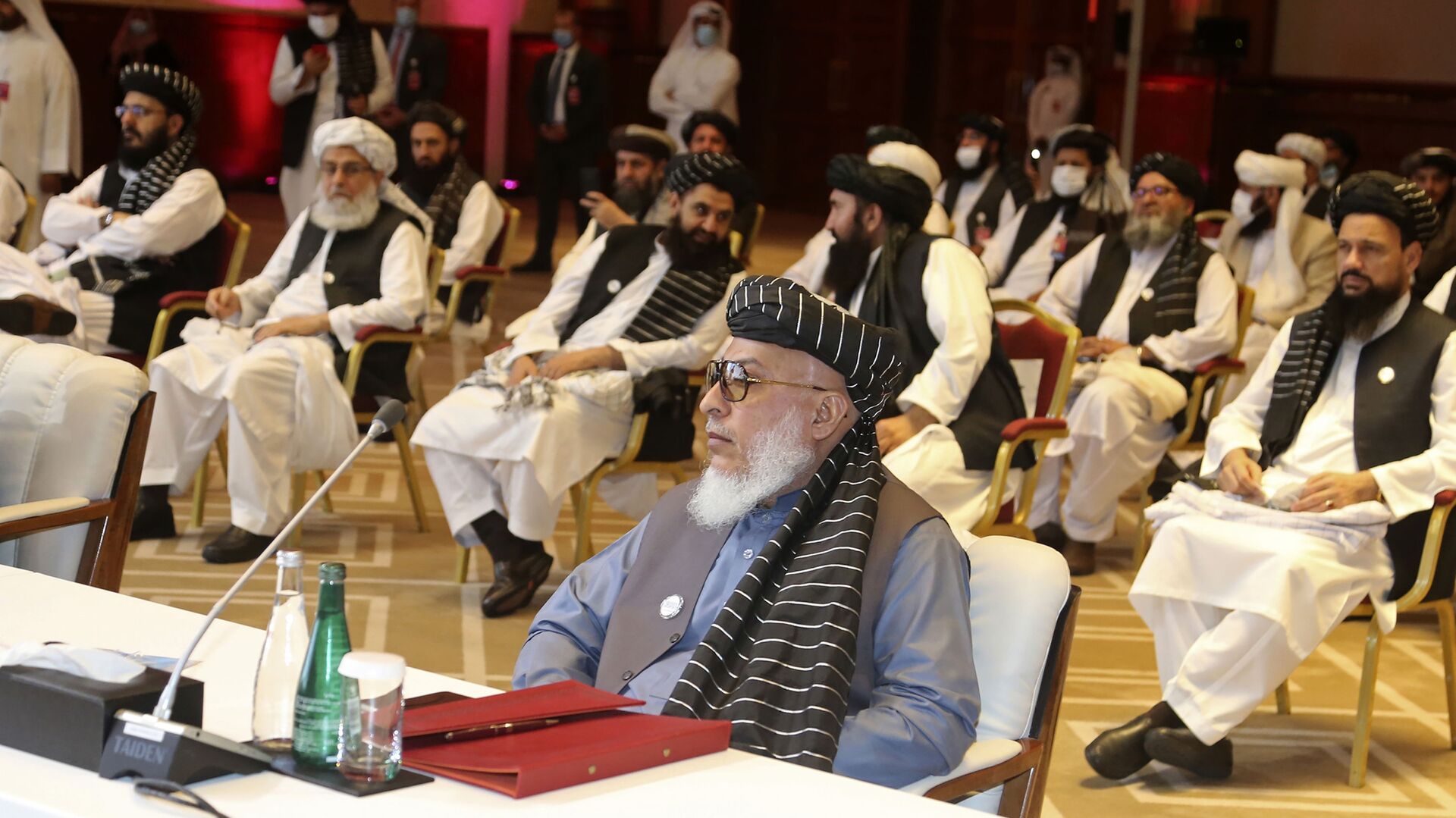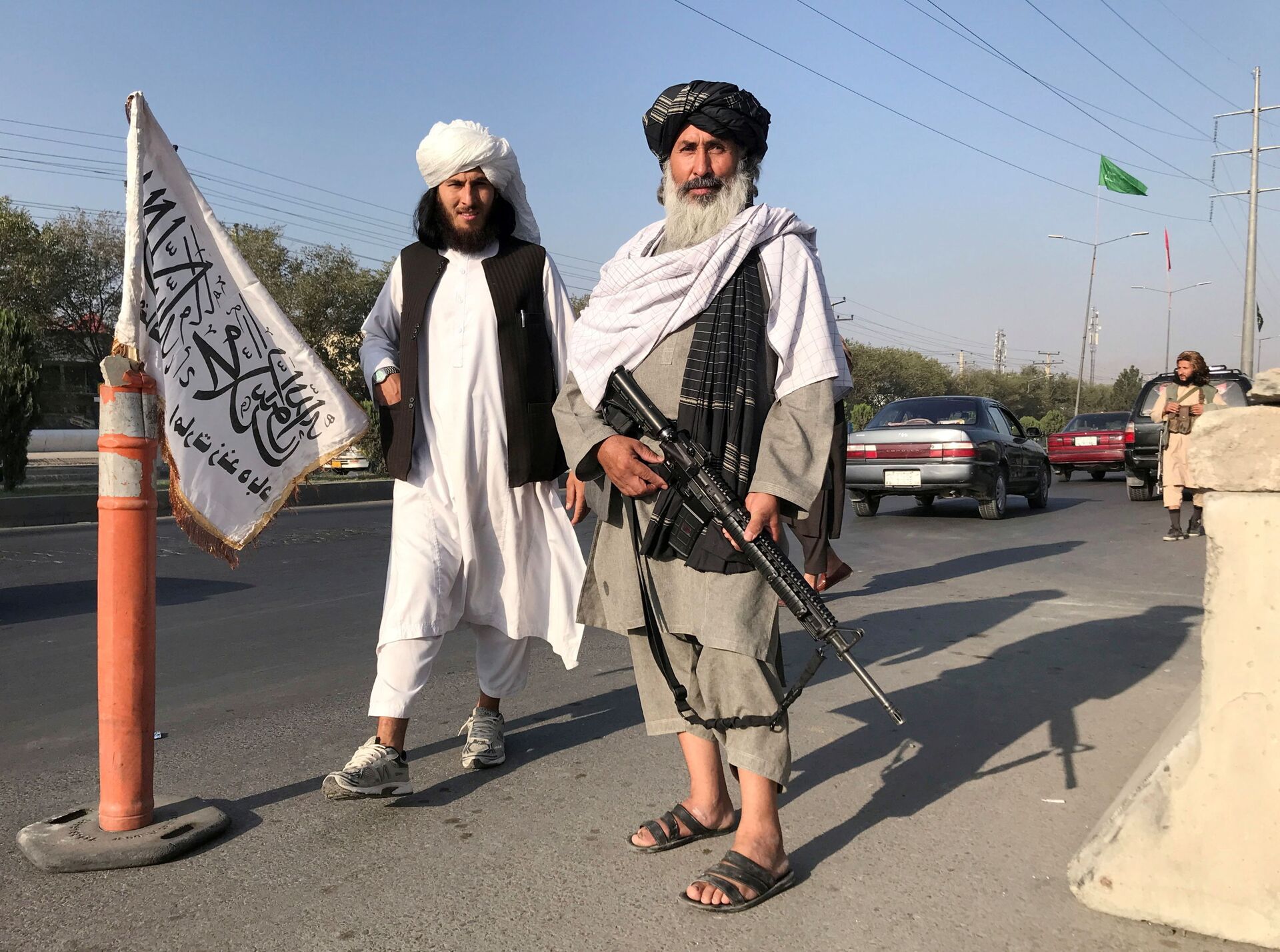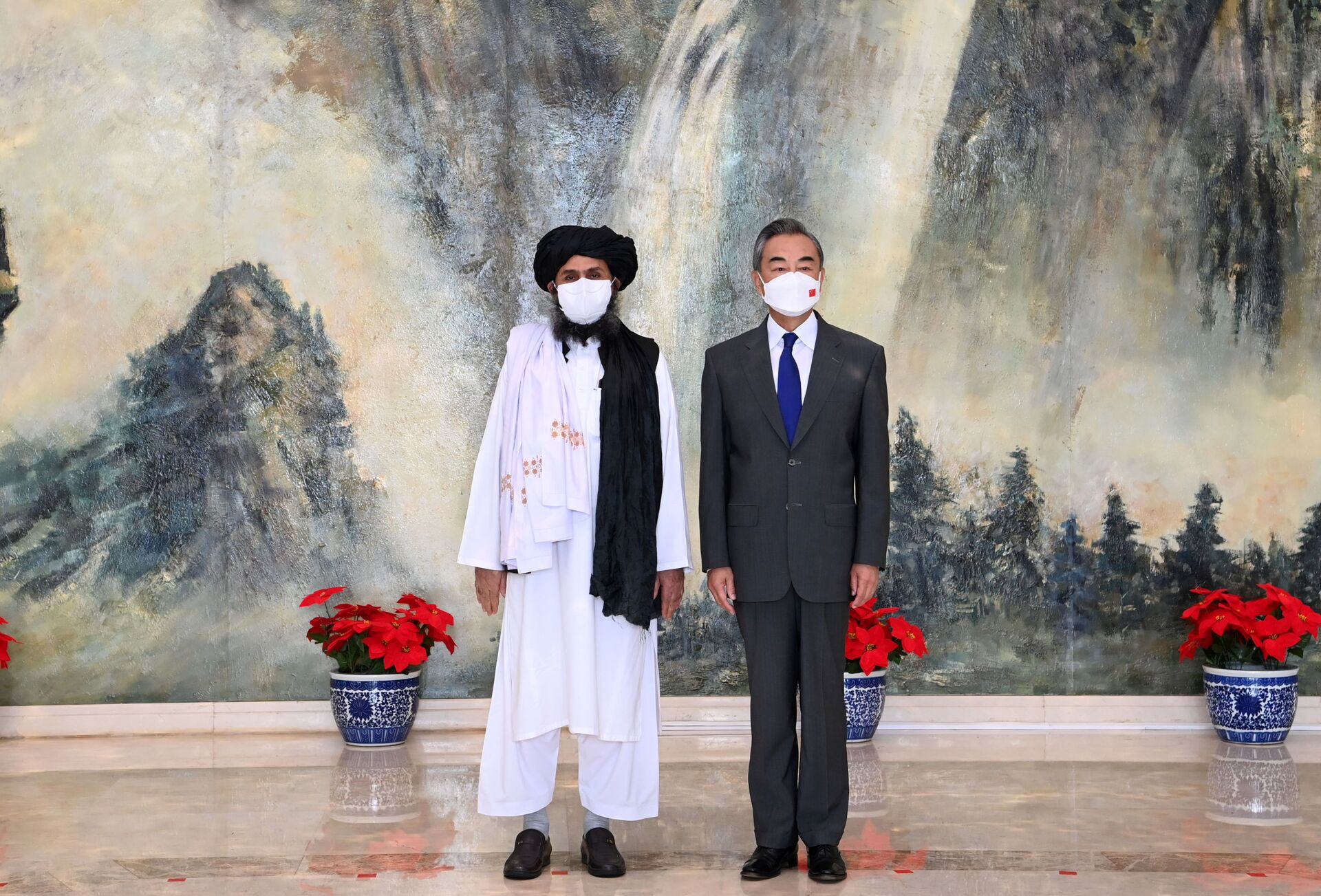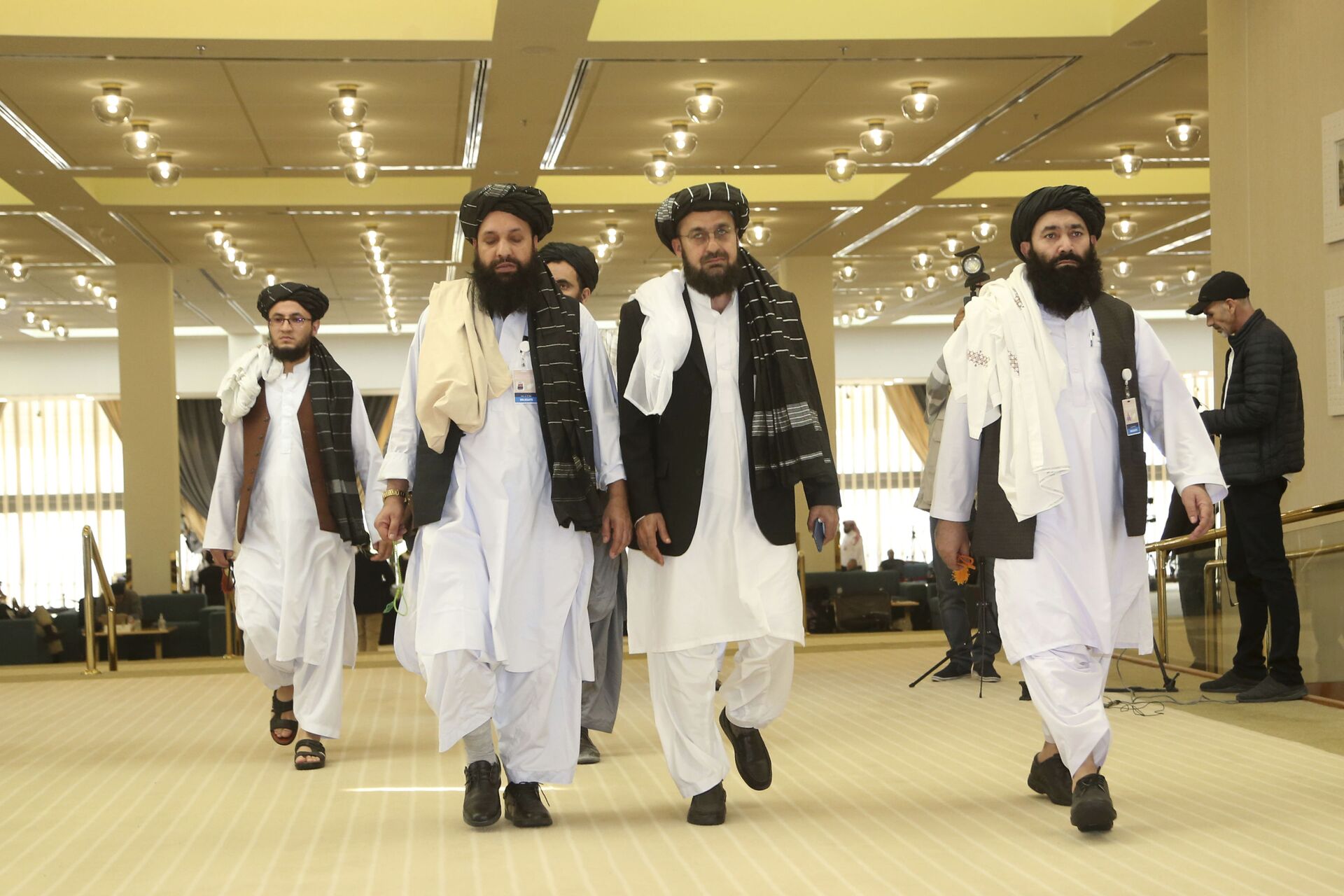What Are the Major Challenges Faced by the Taliban After Their Swift Takeover of Kabul?
10:58 GMT 20.08.2021 (Updated: 13:22 GMT 06.08.2022)

© AP Photo / Hussein Sayed
Subscribe
Following its sweeping offensive and rapid capture of the Afghanistan capital of Kabul, the Taliban* is facing a whole set of domestic and international issues which they need to resolve to gain international recognition, says Pakistani political analyst Sabtain Ahmed Dar.
On 19 August, the Taliban* declared the formation of the "Islamic Emirate of Afghanistan" which coincided with the 102nd anniversary of the country's independence from the British Empire. The movement picked the same name it used when it ruled the country between 1996 and 2001, being recognised at that time by Pakistan, Saudi Arabia, the United Arab Emirates, and Turkmenistan.
Taliban Facing Challenges on Path to Forming New State
"This sudden rise of the Islamic Emirate of Afghanistan explicitly reflects that the Taliban were not faced with any resistance from the general public in all the provinces they have captured," says Sabtain Ahmed Dar, a Pakistani political analyst, academic, and author.
Dar outlines three major reasons behind the latest developments: the "incompetence of the US-installed Kabul regime, who plundered the wealth of Afghanistan and subsequently failed to provide basic rights to the Afghan people"; the "inefficiency of the Afghan National Army (ANA)" which failed to resist the Taliban; and the Afghan people's concerns that the country would be dragged in a new circle of civil war if they fought the insurgent group.
While the Taliban has announced the formation of the new state, it still faces a number of challenges, according to the Pakistani analyst.
First, the Taliban is poised to have the lion's share in the new government; however it will have to deliver on its promise to allow the representation of all major Afghan groups to govern the country.
Second, the new government will have to observe the creation of a new Afghanistan constitution, "based on the foundations of One Islam".
Third, the Taliban leadership has to "ensure the security of all the Afghans, which includes their food, shelter and freedom to prosper".
Fourth, the new Intra-Afghan talks within the Doha format framework should have to take place in order to establish common ground between the Taliban and the rival parties from Central and Northern Afghanistan.
Fifth, the Taliban should reassure the international community that Afghanistan will not be used as a terrorist foothold to target other states; and that it will pursue economic collaboration and integration with the countries of Central Asia and beyond.
However, the challenges do not end here. In the past couple of days, there have been sporadic protests in Nangarhar province and Kabul, where people hoisted the flag of the Islamic Republic of Afghanistan.
On 17 August, Amrullah Saleh, first vice president of the Islamic Republic of Afghanistan under the government of Ashraf Ghani, declared himself acting president of the country.
Clarity: As per d constitution of Afg, in absence, escape, resignation or death of the President the FVP becomes the caretaker President. I am currently inside my country & am the legitimate care taker President. Am reaching out to all leaders to secure their support & consensus.
— Amrullah Saleh (@AmrullahSaleh2) August 17, 2021
In a Twitter post Saleh quoted the 2004 IRA constitution which stipulated that in the event of the absence or death of the president, the first vice president takes the reins of the country. Former President Ashraf Ghani fled the country on 15 August as the Taliban entered the capital.
On 18 August, Ahmad Massoud, the head of the National Resistance Front and son of prominent military commander Ahmad Shah Massoud, wrote an op-ed in The Washington Post, vowing to take on the Taliban. According to him, a well-armed group consisting of Afghan mujahideen, former regular army soldiers and members of the Afghan Special Forces is preparing for resistance against the Taliban in the Panjshir Valley. Massoud called upon "friends in the West" to provide the group with more weapons, ammunition and supplies.

FILE PHOTO: A Taliban fighter holding an M16 assault rifle stands outside the Interior Ministry in Kabul, Afghanistan, August 16, 2021.
© REUTERS / STRINGER
China Consider NATO Far Bigger Threat Than Taliban
While tensions continue to brew in Afghanistan, international players have taken a "wait-and-see" approach and are not rushing to recognise the new state. At the same time, some of them, particularly China, signalled that it is ready to lend a helping hand to the Central Asian country and help rebuild its infrastructure in the event that a stable and inclusive government is formed.
Earlier, during the 28 July 2021 meeting with the Taliban delegation in Tianjin, State Councillor and Foreign Minister Wang Yi stated that the Taliban is "an important military and political force in Afghanistan and is expected to play an important role in the country's peace, reconciliation and reconstruction process".
AFGHAN TALIBAN SPOKESMAN TELLS CHINESE STATE MEDIA CGTN THAT CHINA CAN CONTRIBUTE TO CONSTRUCTION OF AFGHANISTAN IN FUTURE
— Tajuden Soroush (@TajudenSoroush) August 19, 2021
When the Taliban entered Kabul on 15 August, the Chinese did not evacuate their embassy unlike their American and European counterparts. According to Sabtain Ahmed Dar, the Chinese did not panic because Mullah Abdul Ghani Baradar, one of the Taliban's founders, kept Beijing informed on what's going on in the country.

Chinese State Councilor and Foreign Minister Wang Yi meets with Mullah Abdul Ghani Baradar, political chief of Afghanistan's Taliban, in Tianjin, China July 28, 2021. Picture taken July 28, 2021.
© XINHUA
"[Mullah] Baradar emerged to the world as a diplomat for the Islamic Emirate since the inception of the Doha talks in 2019," says Dar. "Baradar recently made a crucial trip to China, where he met his Chinese counterpart, (Foreign Minister) Wang Yi. It is quite evident that Mullah Ghani Baradar has briefed the Chinese counterparts about the actual ground situation of Afghanistan and who is in actual control."
Beijing does not consider the Taliban a threat, according to Dar. In contrast, NATO bases in Central Asia do hit China's raw nerve, he notes.
The Pakistani author explains that China is interested in its neighbours in the region being free from foreign occupation forces for two reasons: first, NATO military deployments in the region are perceived as a challenge by Beijing; second, Western occupation forces hinder the rapid development of Beijing's Belt-and-Road project. Given this, it is hardly surprising that Beijing has welcomed the US-NATO military withdrawal from Afghanistan and maintained pragmatic communications with the Taliban leadership.

Afghanistan's Taliban delegation arrive for the agreement signing between Taliban and U.S. officials in Doha, Qatar, Saturday, Feb. 29, 2020.
© AP Photo / Hussein Sayed
Taliban is Not Part of Any Great Power Bloc
For its part, the Taliban is also interested in building bridges with Beijing, emphasises the Pakistani scholar.
"If we analyse the current situation, it is evident that China would seek to fill this vacuum of power and Taliban will cooperate with Chinese counterparts for economic and political expediency in the region," Dar says. "For the Islamic Emirate, China can play a crucial role as it holds not only veto power in the UNSC but also holds mammoth economic wealth. China can play a crucial role in rebuilding post-war Afghanistan but also it would seek to connect Afghanistan with its Global Belt and Road Initiative (BRI)."
He notes that the BRI’s flagship project is the China-Pakistan Economic Corridor (CPEC), worth billions of dollars, while "connecting the Islamic Emirate of Afghanistan (IEA) with this project would establish strong ties between the Central Asian states."
#Nature comes to shower it's blessings, #rain at @Plant4Pak site #CPEC HAKLA-DIKHAN Western Route under @PakPMO @ImranKhanPTI 's vision of @CleanGreenPK let's all work to turn #Pakistan #green for future generations, let's keep planting @aminattock @PTIofficial#PakistanZindabad pic.twitter.com/TzFRZNXhNa
— Faisal Amin Khan (@FaisalAminKhan) August 15, 2021
"But as I said, the negative implications are also inevitable as these developments would put Indo-US grand strategic objectives in Central Asia in complete jeopardy," he says. "For example, India’s North South Transport Corridor (NSTC) which connects Iran, Afghanistan and the Central Asian states can face a great setback as China and Pakistan would be countering from the North."
According to Dar, it is "really important" for the Taliban to maintain a pragmatic regional policy based on geo-economics. The Pakistani academic notes that this policy "should seek to engage with every party and not indulge in power politics".
He quotes Zabiullah Mujahid, the Taliban’s spokesperson, who said during the 17 August press conference: “We are in contact with China, Russia and Pakistan but it does not mean that we are part of any bloc, we want good relations with the international community and everyone.”
"This implies that Taliban seek to have a policy of neutrality which seems pragmatic, as becoming part of a specific bloc at their infancy would make trouble for their emergence as a sound state," Dar concludes.
*The Taliban is designated as a terrorist organisation in Russia.

